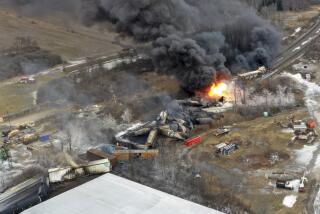The attacks of 9/11
- Share via
Re “Adjusting to 9/11,” editorial, Sept. 11
The Times writes: “As just one example, is the degree of danger posed by the theoretical possibility that terrorists might put a ‘dirty bomb’ in a shipping container really great enough to justify the amount we’re spending to prevent it from happening?”
As just one example, would 9/11 have been prevented or, at least, lessened if we had not imagined that the aborted plan to fly a jetliner into the Eiffel Tower could not possibly happen here?
Rather than downplaying the threat of a dirty bomb, we ought to not only expand our efforts to prevent the imaginable but also expand our efforts to prevent the unimaginable. One only needs to watch the replays of the events of 9/11 to be reminded that the world has changed, and many people want to kill us just because of who we are. Those feelings predate the Bush presidency; please do not suggest that an Obama presidency will solve the problem. Our greatest risk is complacency. Your editorial advocates making it easier for the next terrorist attack to succeed.
Joe Sykora
Woodland Hills
An otherwise cogent analysis of administrative misrepresentations regarding the so-called war on terrorism perpetuates one fallacy. It states, “The attacks of 9/11 were comparable to Pearl Harbor.”
Although the tragic figure of civilian deaths on 9/11 approximates the number of servicemen who died at Pearl Harbor, the analogy weakens on further consideration.
* The attack on Pearl Harbor was carried out by what was then the most formidable naval/air armada in the world, not by a handful of amateurs armed only with box cutters.
* The Pacific fleet -- America’s most powerful military unit on Dec. 7, 1941 -- was crippled, whereas the Pentagon damage on 9/11 failed to diminish U.S. military capability.
* The commanders at Pearl Harbor were held responsible for inexcusable unpreparedness. And 9/11?
Howard Hurlbut
Redlands


